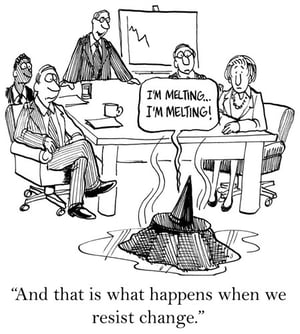Share this
Embracing Change in the Workplace: 4 Tips
by Kevin Kerl on Thu, Feb 20, 2020
 Embracing change in the workplace is a necessary skill for workers in 2020. With continuous shifts in technology, market trends, staff, and processes, it has never been more important for employers and employees to learn how to react to changes in their environment.
Embracing change in the workplace is a necessary skill for workers in 2020. With continuous shifts in technology, market trends, staff, and processes, it has never been more important for employers and employees to learn how to react to changes in their environment.
Even if you don't consider yourself a naturally resilient person, adapting to change is a skill you can learn to master. Here are four steps toward adapting to change in the workplace.
1. Acknowledge any feelings that come up as changes are made in the workplace.
Don't skip this step, no matter how frilly it may sound. You may be thinking "I wouldn't be reading this blog post if I weren't aware of feelings I have toward a recent change in my life." However, what we want to emphasize with this point is that you should take the time to understand your emotions and their sources.
Using positive thinking won't get you through a major transition if there are underlying emotions involved. If you are experiencing anger, is it possible that that anger is rooted in a particular fear of the future? If you're sad, what is it that you feel like you've lost? Gaining a better understanding of your feelings and their sources will help you face those challenges with a rational mindset.
Be kind to yourself through this process. You can't control emotions. You can only control what you do with them.
2. Take the opportunity to practice empathy.
When a change enters the workplace that inconveniences you, it is natural to want to cast blame. But even though it's natural, the blame game is not productive. Focus on what you can control, which is only how you'll deal with it.
It can be helpful, though, to work toward understanding why the change was made. Don't be afraid to talk with a manager or the decision-maker to get the full picture. When you see the challenges they were up against when the decision was made, you may feel more peace to move on with the change at hand.
3. Make the change work for you.
Empathy can only get you so far when adapting to change; it's in our nature to want to know what's in it for us. For this reason, try to see the transition as an opportunity.
And there are numerous benefits of having an open mind throughout periods of change!
The positive aspects of change for employees:
- If you let it, change can expand your opportunities by leaps and bounds. Change can provide you with the opportunity to increase your skillset and develop both professionally and personally.
- Now, more than ever, companies are requiring more out of their employees. This can sometimes blur the lines between work-life and personal-life. To combat this, many employers are adapting by giving their employees the flexibility necessary to uphold their work-life apart from their personal-life, such as flexible work hours or the opportunity to work remotely. Figure out what works best for you!
- We've said it before and we will say it again: change is inevitable. Having an open mind can help you adapt quickly to any changing scenario with more grace.
The positive aspects of change for employers:
- The ability to accept, maintain, and manage a fluid work environment will help your company to show your employees how important it is to continuously grow and adapt to succeed.
- Having a flexible management approach can spur healthy discussions with employees. If you can make employees feel empowered during times of change by listening and valuing their opinions, you will build trust and commitment that will help to retain your most talented individuals.
- Employers that embrace change tend to be more welcoming to innovation. Employees who feel empowered and comfortable are more likely to bring forth new ideas which many times fosters business growth.
4. Employees and employers must work together.
The only true way to experience success in the midst of change is through employers and employees coming together to communicate. The input of employees during a transition is invaluable to an employer. On the other hand, employers can do a number of things to help employees manage change, including:
- Passing down an understanding of why changes are being made.
- Being available for support during transition periods.
- Providing resources employees need to successfully and seamlessly transition into new technologies or processes.
- Giving employees reminders and feedback to help sustain changed behavior in the long run.
Although the notion of change may push you out of your comfort zone, know that you are contributing to the growth of yourself both personally and professionally. Do you have advice for embracing change in the workplace? Let us know in the comments below!
Editor's Note: Originally published 2/16/16; updated 2/20/20.
Share this
- October 2022 (2)
- September 2022 (1)
- August 2022 (1)
- July 2022 (4)
- June 2022 (3)
- May 2022 (2)
- February 2022 (2)
- May 2020 (2)
- April 2020 (8)
- March 2020 (6)
- February 2020 (4)
- January 2020 (2)
- December 2019 (3)
- November 2019 (2)
- October 2019 (9)
- September 2019 (6)
- May 2019 (4)
- April 2019 (9)
- March 2019 (7)
- February 2019 (10)
- January 2019 (4)
- December 2018 (12)
- November 2018 (6)
- October 2018 (4)
- September 2018 (6)
- August 2018 (14)
- July 2018 (8)
- June 2018 (7)
- April 2017 (1)
- February 2017 (5)
- January 2017 (8)
- December 2016 (8)
- November 2016 (3)
- October 2016 (7)
- September 2016 (8)
- August 2016 (7)
- July 2016 (6)
- June 2016 (9)
- May 2016 (7)
- April 2016 (9)
- March 2016 (8)
- February 2016 (6)
- January 2016 (8)
- December 2015 (7)
- November 2015 (7)
- October 2015 (7)
- September 2015 (8)
- August 2015 (11)
- July 2015 (8)
- June 2015 (4)
- May 2015 (5)
- April 2015 (4)
- March 2015 (4)
- February 2015 (7)
- January 2015 (8)
- December 2014 (5)
- November 2014 (2)



No Comments Yet
Let us know what you think